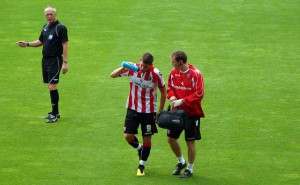Professional football player, Ched Evans, 25, has recently been released from prison after serving only half of his five-year sentence, having being convicted of rape of a 19-year-old girl. As a result he will remain on the sex offenders list for the rest of his life.
Evans, who is out on license, has since appeared in an online video statement with his girlfriend, Natasha Massey, stating that it was “an act of infidelity” rather than rape.
Since his release, there has been a storm of controversy surrounding Evans’s announcement that he would like to rejoin the professional field of football. Evans acknowledges that “it is a rare and extraordinary privilege to be permitted to play professional football”. However, he does not apologise for what happened nor does he express any kind of regret.
It begs the question, should this high-profile sports person be allowed to return to his professional career having violated his position as a role-model?
Charlie Webster, Sky Sports TV presenter and patron of Sheffield United Club Charity, has said she will sever her connection if Evans is reinstated. In light of reports that Sheffield United fans have been chanting “Super Ched Evans, he can do what he wants” at home matches, Webster believes Evans should not be cheered on a pitch as a hero having been found guilty of rape. More than 156,000 people have signed a petition to lobby against Evans being allowed back as striker.

Dr Nina Burrowes, who specialises in the psychology of rape and sexual abuse, suggests that Evans will only find redemption if he acknowledges that he is a rapist. She argues that because Evans has not uttered a single word of remorse for his actions, he should not be allowed to play on a professional level again.
If Evans had apologised and accepted what he did was wrong, both legally and morally, he would be able to move forward with his life. In addition to his own well-being, his confession would show the younger generation that forced sex is wrong, that serving a sentence in prison alone is not enough, but you have accept your guilt.
Sheffield United once paid £3 million to sign Evans. His football career to date has been filled with success, scoring 59 goals in 167 appearances during stints with Manchester City, Norwich City and Sheffield United. Evans’s QC, David Fisher, remarked following the conviction “that career has been lost”. Ultimately, the decision lies with what impression the club wishes to portray by allowing Evans to represent them once again.
Crime statistics show the number of rapes being reported is at its highest level. What message would it send out to the victims and perpetrators of rape if this high profile rapist is able to simply step back into his old life as if nothing had happened.
Should it be down to the club to make this decision, or should the FA have a Code of Conduct for these very highly paid men, who surely have an obligation to be positive role models and maintain their professionalism?
Sheffield United are left with a genuine dilemma. They must decide whether Evans has served his time and therefore should be allowed to re-enter as a top player, or, actually, that he has committed a serious offence and shown no remorse, thereby forfeiting any right to continue. Deputy Prime Minister and MP for Sheffield Hallam, Nick Clegg, has stated that the club must “think really long and hard” about whether to allow Evans back. Whatever they decide, they will have to live with the consequences and getting it wrong could have serious repercussions for the club.
By Beatrice Taylor





I would not normally be in favour of a convicted rapist being able to return to a high profile job as a professional footballer.
It is impossible though to separate the issue of whether Evans should be able to return to football from how you feel about his actual conviction. This was a far from straightforward case and anyone commenting on it ought to go and have a look at as much detail about it as they can find. What they see might disturb them about the current state of our rape laws and our justice system.
I have been a lifelong femininst. I have done much soul searching over this case and feel that the term equity feminist is not a strong enough one any more to counterbalance other feminists who have become gender bigots.In their bigotry they have not even really served the wider interests of their own gender. The interpretation of what does and does not constitute drunken consent in this case grotesquely infantilizes women. A drunk woman who said no was previously ignored, her agency overridden and a prime case for gang rape. A drunk woman who says yes is now without agency once a judge offers the opinion that she was in no fit state to consent. Agency and consent must be equally upheld in all situations with men and women. This should be an unassailable cornerstone of our law. I want to help rape victims and make sure that more rapists get convicted, but not at the expense of the basic tenets of justice. In relinquishing our status as proper grown ups and handing the responsibility for our own consent back into the hands of men, we are cutting our noses off to spite our faces. The rapists and misogynists must be laughing themselves silly.